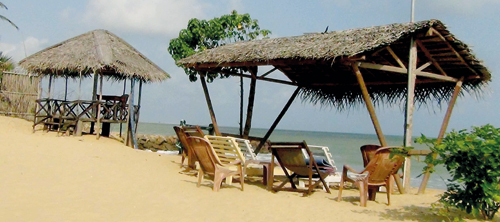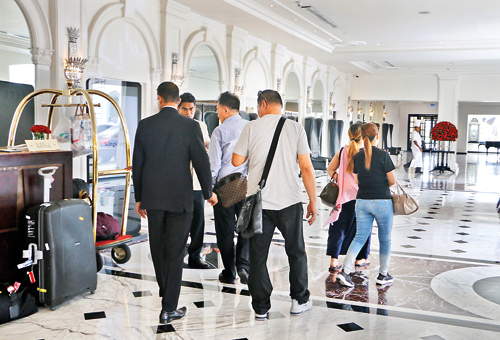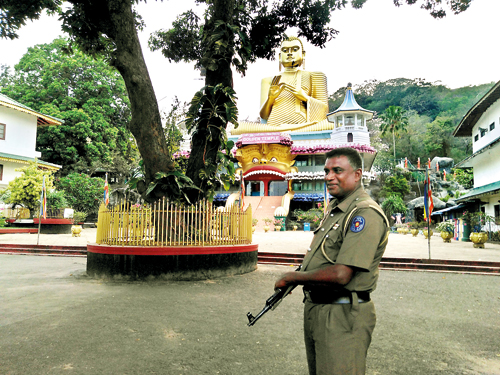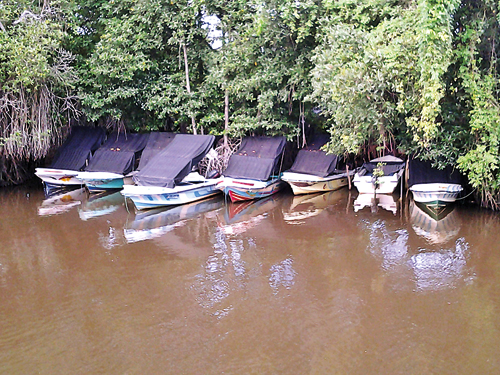News
Heartbreak hotel all over Lanka

Kalpitiya beaches: No tourists for kitesurfing or whalewatching. Pic by Hiran Priyankara Jayasinghe
The armchair view from Colombo’s Taj Samudra of the Galle Face Green and the blue waters of the Indian Ocean is breathtaking.
Kings with their consorts, heads of state with their grandiose limousines, politicians, bureaucrats and food-loving Sri Lankans with a penchant for Indian cuisine have crossed the wide entrance day in and day out.
Last week, it was closed. Behind the iron gates lay coiled concertina wire – the kind of barbed wire that protects high-security military installations. Entry is from one corner. Drivers are asked to alight and open the car bonnet, where a security officer examines a running engine for hidden explosives. How he sees a bomb there or not is unclear but the ritual ends in a few seconds.
At the entrance, guests have to surrender their mobile phones to a lady holding a tray and walk through an arched metal detector. If a beep sounds there is another search with a hand-held detector. Not always are the security staff polite. Guests are greeted by an army (red beret) commando with his finger on the trigger of an automatic rifle.
The experience at one of the restaurants is depressing. The regular thali (or food platter with rice and curries the Indian way) is delayed. It arrives some 40 minutes late and one sees a marked difference – instead of sliced onions and green chillies there is onion sambol the Sri Lankan way. Instead of rice, there is pre-cooked biriyani and dhal makhni.
The restaurant has fewer than eight guests. The waiting areas are empty except for the hotel staff and the occasional soldier on guard. Business is far from normal.

Few tourists at a hotel in Colombo. Pic by Priyanka Samaraweera
Six weeks after the appalling bombings of hotels and churches that killed some 250 people on Easter Sunday, the scene is the same in the Cinnamon Grand, the Cinnamon Lakeside and other five-star hotels in Colombo: tourist occupancy is very low and most Sri Lankans are reluctant to walk in and go through the security hassles.
In Europe, which has also suffered the evils of terrorism, it is different: security measures exist but they are not visible. Here, the display of security might be a deterrent to attacks but it has also become a deterrent to clients.
At a church in Negombo, organisers of a wedding are telephoning guests to ask them not to come to the church ceremony. The church authorities have said that only 25 guests each from the groom’s and the bride’s side would be allowed. At a funeral in Nayakakanda, Wattala only the immediate family members are allowed to join the funeral service in the church.
What do these events show? It is the reality that the situation in the city is still far from normal notwithstanding the fact that both President Maithripala Sirisena and Prime Minister Ranil Wickremesinghe met the Colombo-based diplomatic community at separate meetings to plead for foreign business.
They made one appeal: to revise the travel advisories released by their countries on the risks to their nationals visiting Sri Lanka.
Some diplomats said it was too early to rescind the warnings and wanted more time. Others, like India, Germany, Switzerland, Sweden and China amended the advisories to encourage their citizens to visit Sri Lanka. Some changed them from strict instructions such as “Avoid non-essential travel to Sri Lanka” to more relaxed terms such as “Employ extreme caution when travelling to Sri Lanka”.
Major countries such as the US, UK, and also Australia, have not yet changed their stance on the travel warnings.
The country is bleeding from the wounds dealt to the tourist industry through the bombs exploded by Islamic extremists on April 21.

Dambulla: Promotions are being launched to attract tourists. Pic by Kanchana Kumara Ariyadasa
Tourists are hard to find anywhere in the outstations, whether in the coastal areas or the central parts of the country such as Sigiriya, Nuwara Eliya, Anuradhapura and Polonnaruwa.
As a result, hotels in the coastal belt are targeting local visitors more than foreign tourists.
A reservations manager at a luxury beach hotel in Negombo, Sachini Wijeratne, said hotels were mostly receiving Sri Lankan and resident expats and only a few foreign tourists after the bombings.
“There are much fewer bookings by locals on weekdays but with special offers the hotels are getting filled during the weekends,” she said. Hotels are offering 50 per cent discounts and special promotions to attract local tourists.
“Our country was the number one tourist destination before the blasts. Now, the tourism authorities should promote tourism by showing the world that our country is safe,” Ms Wijeratne said. She thinks the few foreign tourists that hotels are seeing have arrived following the relaxation of some travel advisories.
Well-known tourist sites have been hard-hit by the drop in visitors. Sigiriya, considered the eighth wonder of the world, used to be swamped by huge numbers of foreign as well as local tourists but now there are few who come to climb the famous rock.
The Cultural Triangle Hoteliers and the members of Association for Dambulla and Sigiriya Tourism Promotion took matters into their hands and embarked on a tour to a number of European countries to promote tourism to Sri Lanka.
Saliya Dayananda, who is the head of both organisations, said the team visited Austria, Italy, Germany and Switzerland on a drive to attract tourists to Dambulla and Sigiriya.
“We received a positive response from the travel agencies. Hopefully, European tourism will be back up to the level we want it to be at by next winter,” Mr. Dayananda said.
In the south, the boat services that attracted many tourists to Kaluwamodara, adjoining the Bentota River, have not been operating since the Easter Sunday attacks because the tourists have stopped coming. The boat safaris explored the mangroves along the riverside.
Kalpitiya, another popular destination, has also been hit badly. The tourists normally there for kite-surfing and dolphin and whale-watching are absent. The beaches, once full of foreign nationals, are deserted.

Maduganga in Aluthgama: No tourists for boat rides along the river. Pic by Thusitha de Silva
A hotel owner in Kalpitiya, W.M. Emmanuel, said in May the city used to be packed with foreigners. “I operate a small hotel but after the terrorist incident both local and foreign tourists have stopped coming to my hotel and I’m finding it difficult to maintain my hotel and pay salaries to the employees. He is falling behind on the bank loans he had taken to set up his business.
The head of the Kalpitiya Tourist Boat Operators’ Association, said their members’ survival depended on taking tourists out to sea to watch whales and dolphins.
“This is the worst time we have ever had,” association head W. Roy Priyantha said. “We can’t make a living. Even when we had a 30-year war with the LTTE we were able to make a living, but suddenly everything has changed after the April attacks.”
French national Leo Moret, who runs a hotel in the Kandakuliya area in Kalpitiya, said he believes Sri Lanka is a safe country.
“Incidents similar to this incident had happened in my country but the arrival of tourists never decreased. The Sri Lankan government should take up its responsibility to state that Sri Lanka is a secure place and tell tourists not to be scared of rumours,” he said.
“If the government gives assurances about safety the tourists will return,” Mr. Moret said.
The damage to the economy was described in stark terms by Harith Perera, president of the Sri Lanka Association of Inbound Tourist Operators.
“We are seeing a 30 per cent drop in arrivals, resulting in a $US1.5 billion hit to the sector,” he said.
“The whole tourist industry is affected directly. Not only hotels but travel agents, chauffeur guides, transport suppliers, excursions suppliers such as safari jeeps, shops and restaurants – the list is endless.
“Also, indirectly, it affects others such as fish, fruit and vegetable sellers who do business with hotels, tuk-tuk drivers and many others. The impact could be greater than we think.”
Mr. Perera said the industry was studying similar incidents in other countries to develop feasible forecasts of how long the industry would take to return to normal.
“We have studied similar incidents in Bali, Paris and Bombay. Looking at the nature of the incident, the internal and external factors, we feel Sri Lanka should be back fully in nine to 12 months. We can get there faster if the marketing and PR activation happens as planned,” he said.
 Giving a snapshot of the damage to the Yala destination, Sri Lanka Association of Inbound Tour Operators (SLAITO) spokesman Nishad Wijetunge commented on the drop in employment for safari vehicles operating in the national park: “It was reported that 400 jeeps had dropped to four or five a day. It has increased now to between 40 and 50 but is still nowhere near what it was.”
Giving a snapshot of the damage to the Yala destination, Sri Lanka Association of Inbound Tour Operators (SLAITO) spokesman Nishad Wijetunge commented on the drop in employment for safari vehicles operating in the national park: “It was reported that 400 jeeps had dropped to four or five a day. It has increased now to between 40 and 50 but is still nowhere near what it was.”
In Kandy, there is a trickle of guests in hotels. “Earlier, two weeks after the attacks, none of the hotels had even a single guest. Now the hotels are at around 10 per cent of maximum capacity,” the President of the Kandy Hoteliers Association and General Manager of Amaya Hills, Samantha Ratnayake, said.
“It is better than what it was before – the local travellers have helped fill the hotels,” he said.
More locals were taking holidays, tempted by credit card promotions and massive discount packages. A recent advertisement showed a hotel on Pigeon Island, off the Nilaweli coast, offering rates of up to 60 per cent off original prices.
Mr. Ratnayake hopes the sector would be back on track within two to three months. He said it was a positive sign that there have not been many cancellations for the period following the Kandy Esala Perahera compared to cancellations for May and June.
| False bomb panic in schools | |
| Several schools in the Negombo and Colombo faced commotions due to rumours of terror attacks.In one instance in Colombo, police had called in and instructed the school authorities to clear up a litter of broken desks and chairs, but this visit sent rumours slying around that police had come to warn of a bomb threat. In another instance, police had called in to warn parents not to park their vehicles opposite the school, and this sparked rumours that the police had brought news of a bomb threat. In both cases, some parents had come and taken their children away. |
| Italy also updates travel advisory | |
| The Italian Embassy in Colombo yesterday said that it was updating its travel advisory on its website for all Italian nationals travelling to Sri Lanka. The update advises Italian nationals intending to travel to Sri Lanka, to exercise the utmost caution.The improved outlook of the update adds that the security situation in Sri Lanka is gradually returning to normal even if a state of emergency is still in force until June 21. It further recommends avoiding areas directly affected by possible police operations and points with a large public turnout (such as places of worship, shopping centres, events, etc.) limiting travel in general, and following local authorities’ indications. It also advises travellers to be updated with news of any further developments. Pointing out that since Colombo’s international airport is operational, the advisory has asked those departing from Sri Lanka to reach early due to additional security checks. |

